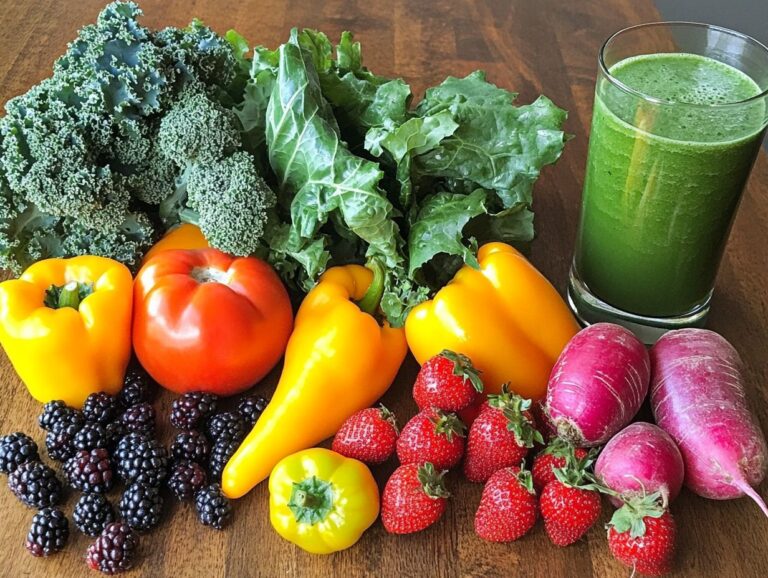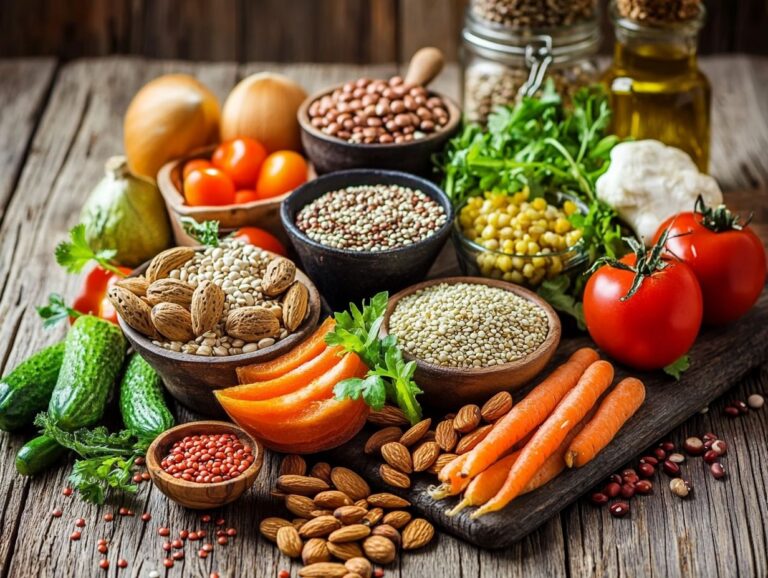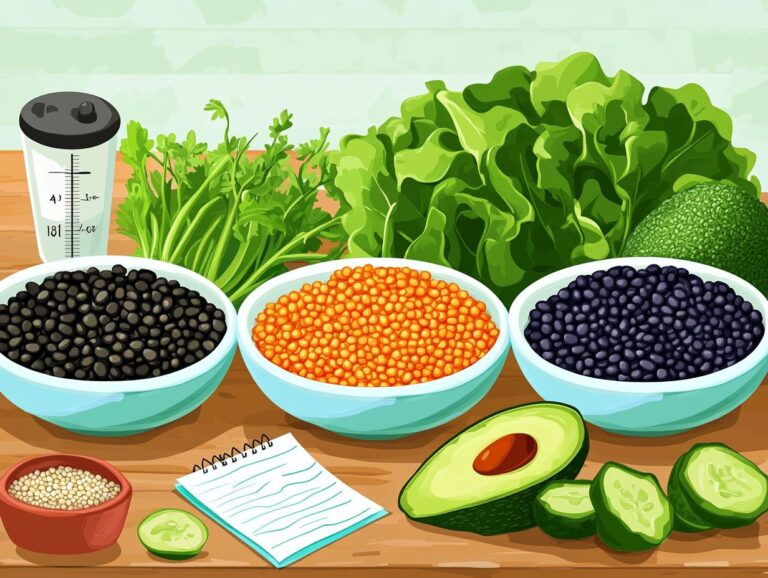This article explores how a vegan diet can contribute to weight loss by outlining the advantages and disadvantages of a plant-based diet. It also discusses the challenges you may encounter when adopting this lifestyle and offers suggestions for a successful transition, along with resources to support you. Whether you choose to go vegan for health, environmental, or ethical reasons, this guide provides valuable insights.
Key Takeaways:
- Eating a vegan diet, which includes only plant-based foods, can have numerous benefits including weight loss, reduced risk of chronic diseases, improved nutrition intake, and support for environmental sustainability.
- A plant-based diet can lead to weight loss due to the lower calorie content of plant-based foods, high fiber content that keeps you feeling full, and the elimination of unhealthy foods.
- Transitioning to a vegan diet for weight loss can be challenging, but starting slowly, focusing on nutrient-dense foods, experimenting with new recipes, and seeking support can make the process easier.
What is a Vegan Diet?
 A vegan diet is a lifestyle choice that excludes all animal products and instead focuses on a diverse array of plant-based foods, including fruits, vegetables, whole grains, legumes, nuts, and seeds. This dietary approach not only emphasizes ethical considerations, such as animal welfare and environmental sustainability, but also aims to enhance health through nutrient-rich, whole food options. By eliminating dairy, meat, and eggs, individuals can explore a variety of plant sources that provide essential nutrients while effectively addressing concerns related to vitamin deficiencies. Additionally, a vegan diet is associated with health benefits, including improved energy levels and a reduced risk of chronic diseases.
A vegan diet is a lifestyle choice that excludes all animal products and instead focuses on a diverse array of plant-based foods, including fruits, vegetables, whole grains, legumes, nuts, and seeds. This dietary approach not only emphasizes ethical considerations, such as animal welfare and environmental sustainability, but also aims to enhance health through nutrient-rich, whole food options. By eliminating dairy, meat, and eggs, individuals can explore a variety of plant sources that provide essential nutrients while effectively addressing concerns related to vitamin deficiencies. Additionally, a vegan diet is associated with health benefits, including improved energy levels and a reduced risk of chronic diseases.
What are the Benefits of a Vegan Diet?
A vegan diet offers numerous benefits, including improved health, weight loss, and environmental protection. Research and intervention studies consistently demonstrate that a plant-based diet can lead to advantages such as weight loss, increased energy levels, and a reduced incidence of type 2 diabetes and cardiovascular disease, among other chronic conditions. When well-planned, a vegan diet ensures nutritional adequacy and provides a rich source of fiber, healthy fats, and antioxidants. These elements contribute to fostering a healthy relationship with food and promoting mindful eating habits.
1. Promotes Weight Loss
The primary benefits of a vegan diet include promoting weight loss, largely due to the naturally low caloric density and high fiber content of plant-based foods. This characteristic allows individuals to maintain a caloric deficit while still feeling satisfied, making it easier to control portion sizes and reduce unnecessary snacking between meals. Research indicates that people following a vegan diet tend to consume fewer calories on average, with studies showing a mean weight loss of approximately 5-10% among those who adopt a plant-based diet. The fiber found in fruits, vegetables, legumes, and whole grains contributes to a feeling of fullness, decreasing the likelihood of overeating. Additionally, plant-based foods are nutrient-dense, enabling individuals to meet their nutritional needs even while consuming fewer calories. By focusing on whole, nutrient-rich foods instead of processed options, a vegan lifestyle can effectively support weight loss while promoting a balanced diet that fosters overall and long-term health.
2. Reduces Risk of Chronic Diseases
The vegan diet significantly decreases the risk of chronic diseases such as cardiovascular disease and type 2 diabetes. This reduction can be primarily attributed to the high antioxidant and fiber content found in vegan diets, which enhance immune function and promote beneficial changes in gut microbiota. Research indicates that plant-based diets help lower blood pressure and cholesterol levels, contributing to improved health and longevity. Vegan diets are particularly effective in achieving these outcomes because they emphasize the consumption of natural foods such as fruits, vegetables, legumes, and whole grains, all of which are associated with better health results. Scientific studies demonstrate that these foods are low in saturated fats and rich in vitamins, minerals, and phytochemicals. Notably, the high fiber content in legumes and whole grains has been linked to improved glycemic control, which is especially crucial for individuals at risk of developing type 2 diabetes. Additionally, a vegan diet reduces the likelihood of heart disease by decreasing inflammation and enhancing metabolic health, making it a vital component of sustainable long-term wellness.
3. Improves Nutritional Intake
Improving nutritional intake is a significant benefit of a vegan diet, as it encourages individuals to make healthier dietary choices and explore a variety of nutrient-rich foods. By focusing on whole foods and plant-based sources, individuals can enhance their consumption of essential vitamins and minerals, which can help address deficiencies and improve overall nutritional status, often with guidance from a registered dietitian or through cooking classes. Adopting a vegan lifestyle opens up a world of flavors and textures, allowing individuals to experiment with grains, legumes, nuts, seeds, fruits, and vegetables in countless combinations. Meal planning techniques, such as batch cooking or designating specific days for meal prepping, can help ensure a balanced intake of macronutrients, including appropriate amounts of carbohydrates, proteins, and healthy fats. Incorporating a variety of colors on the plate is an excellent indicator of consuming a broad range of nutrients. Additionally, community cooking classes or virtual vegan support groups can provide ongoing encouragement and inspiration for those who choose this lifestyle.
4. Supports Environmental Sustainability
 A vegan diet promotes environmental sustainability by reducing the demand for animal agriculture, which is a major contributor to greenhouse gas emissions and the depletion of natural resources. Individuals who choose plant-based foods are not only making dietary decisions based on ethical considerations to avoid animal products; they are also supporting community initiatives that encourage more sustainable food practices and respect for dietary restrictions. This shift fosters sustainable agricultural practices such as permaculture and regenerative farming, which enhance biodiversity and improve soil health. The impact of adopting a vegan lifestyle extends beyond individual choices; it positively influences local economies and creates a demand for sustainable products. By embracing a vegan lifestyle, individuals contribute to a collective awareness of the importance of protecting the planet for future generations.
A vegan diet promotes environmental sustainability by reducing the demand for animal agriculture, which is a major contributor to greenhouse gas emissions and the depletion of natural resources. Individuals who choose plant-based foods are not only making dietary decisions based on ethical considerations to avoid animal products; they are also supporting community initiatives that encourage more sustainable food practices and respect for dietary restrictions. This shift fosters sustainable agricultural practices such as permaculture and regenerative farming, which enhance biodiversity and improve soil health. The impact of adopting a vegan lifestyle extends beyond individual choices; it positively influences local economies and creates a demand for sustainable products. By embracing a vegan lifestyle, individuals contribute to a collective awareness of the importance of protecting the planet for future generations.
How Does a Vegan Diet Lead to Weight Loss?
A vegan diet supports weight loss by offering the unique benefits of plant-based foods, which collectively contribute to achieving a sustainable calorie deficit and a high-fiber intake. By making informed dietary choices, practicing effective portion control, minimizing mindless eating, and adopting healthy snacking habits, individuals can set the stage for long-term success in weight management.
1. Plant-based Foods are Generally Lower in Calories
Plant-based foods are generally lower in calories compared to animal-based foods, making them effective for achieving a calorie deficit for weight loss. These foods also contribute to portion satisfaction, as individuals can consume larger servings of low-calorie-density foods while still feeling full, without exceeding their daily calorie limits. For instance, one cup (30g) of raw spinach contains only about 7 calories, whereas a similar serving of chicken breast contains over 200 calories. Research has indicated that individuals following a plant-based diet tend to have lower body mass indexes (BMIs), likely due to the high fiber content found in beans, lentils, and whole grains, all of which enhance feelings of fullness. A study published in the Journal of the American Heart Association revealed that participants adhering to a plant-based diet lost an average of 15 pounds within a year. This evidence suggests that incorporating plant-based foods into one’s diet can facilitate weight loss and support the achievement of long-term health goals.
2. High Fiber Content Keeps You Feeling Full
The high fiber content found in many plant-based foods helps individuals feel full and satisfied, which is crucial for effective weight loss. A diet rich in fiber not only slows digestion but also promotes healthy changes in gut bacteria, among other benefits. This essential nutrient regulates blood sugar levels, preventing sudden spikes that can lead to cravings and overeating. Additionally, fiber absorbs water, contributing to a feeling of fullness and potentially reducing the tendency to snack between meals. Consuming a variety of legumes, whole grains, fruits, and vegetables ensures that you receive both soluble and insoluble fiber, each offering distinct advantages. This is particularly important for those following a vegan diet, as these components support healthy and sustainable weight loss. Incorporating adequate fiber into meals is a vital aspect of a nutritious, plant-based diet.
3. Eliminates Unhealthy Foods
A vegan diet, as part of a broader plant-based diet, naturally excludes many unhealthy foods commonly found in poor diets, such as processed meats, high-calorie sugary snacks, and high-fat unrefined carbohydrates. This shift encourages better eating habits and enables individuals to focus more on healthier alternatives, contributing to various health benefits. As a result, it promotes improved portion control and reduces the likelihood of mindless snacking. By substituting unhealthy options with nutritious plant-based foods, one can enhance the quality of their diet, regulate blood sugar levels, and facilitate weight loss. For instance, replacing sugary breakfast cereals with oatmeal topped with fresh fruits provides essential fiber and nutrients without the extra sugars. Similarly, swapping chips for air-popped popcorn or veggie sticks with hummus can satisfy cravings while avoiding high unhealthy fat content and excess calories.
What are the Potential Pitfalls of a Vegan Diet?
 The vegan diet offers numerous health benefits, including the potential reduction of chronic diseases, but it also presents potential challenges that individuals must address to maintain a balanced and healthy lifestyle. Common pitfalls include the risk of nutrient deficiencies, particularly in vitamin B12 and adequate protein sources from plant sources, especially for gastrointestinal patients or those with other dietary restrictions.
The vegan diet offers numerous health benefits, including the potential reduction of chronic diseases, but it also presents potential challenges that individuals must address to maintain a balanced and healthy lifestyle. Common pitfalls include the risk of nutrient deficiencies, particularly in vitamin B12 and adequate protein sources from plant sources, especially for gastrointestinal patients or those with other dietary restrictions.
1. Nutrient Deficiencies
The most significant risk associated with a vegan diet is the potential for nutritional deficiencies, particularly in vitamin B12 and omega-3 fatty acids, which are primarily found in animal products. To mitigate these deficiencies, individuals may need to consider dietary supplements or fortified foods to ensure they are consuming adequate amounts of these essential nutrients. Consulting with a registered dietitian can also help address these concerns. Additionally, nutrients such as iron, calcium, and vitamin D can also be challenging to obtain in sufficient quantities without careful planning. Vegans can address these gaps by incorporating foods rich in these nutrients, such as leafy greens, legumes, nuts, and seeds, into their diets. This approach supports a fiber-rich diet, crucial for maintaining a diverse microbiome. Fortified plant-based milks and cereals are excellent sources of calcium and vitamin D. For those who struggle to meet their nutritional needs through diet alone, specific dietary supplements can be beneficial, particularly for vitamin B12 and omega-3s, with algal oil supplements providing a vegan alternative. Education on meal planning and nutrient pairing is essential for achieving a balanced and healthful vegan lifestyle, ensuring nutritional adequacy and preventing vitamin deficiencies.
2. Difficulty Eating Out
A vegan diet presents challenges, particularly when dining out, due to limited options and dietary restrictions. These issues can be addressed by researching restaurants in advance and seeking community support that shares information about establishments meeting vegan requirements. Utilizing resources from organizations like the Vegan Society can provide additional guidance. Individuals following a vegan diet may feel overwhelmed by menus filled with meat and dairy options. To navigate these difficulties, they can utilize resources such as vegan apps and websites that provide directories of restaurants, along with user reviews and suggestions for specific dietary intolerances. Additionally, social media groups and forums dedicated to vegan dining are excellent platforms for sharing experiences and recommendations. Connecting with other vegans fosters a sense of community, making the dining experience more enjoyable and less isolating, while also encouraging restaurants to expand their plant-based offerings.
3. Social Pressures
Social pressures pose a significant challenge for individuals following a vegan diet, as they may feel compelled by friends and family to abandon their dietary restrictions or may feel misunderstood or judged for their choices. Overcoming these social pressures often requires psychological adjustments and a reliance on community support to maintain commitment and share experiences. Social situations where traditional foods are present can intensify feelings of isolation for those who diverge from society’s dietary norms. In such circumstances, having open conversations with close friends and family about the ethical and health-related reasons for their lifestyle choices is essential. Communities of like-minded individuals whether local or online offer support and shared experiences that foster a sense of belonging and help alleviate feelings of alienation typically associated with the psychological challenges of a vegan diet. Engaging with groups focused on ethical reasons can provide further motivation. Additionally, sharing recipes and experiences with others can provide practical coping strategies and create a supportive network that strengthens individual resolve against social pressures.
How to Transition to a Vegan Diet for Weight Loss?
Adopting a vegan diet for weight loss can be a gradual and enjoyable process if approached with care. By starting slowly and focusing on the inclusion of healthy foods, individuals can shift their dietary preferences while discovering new foods they enjoy and exploring preferred cooking methods. This journey is often enhanced by participating in cooking classes and utilizing community resources.
1. Start Slowly
 The best approach to transitioning to a vegan diet is to do so gradually. Experts recommend slowly replacing animal products with plant-based foods to encourage mindful eating and allow for adjustments in dietary choices. This gradual transition makes the process smoother and helps reduce feelings of deprivation. To begin, individuals can start by incorporating more fruits, vegetables, legumes, and whole grains into their daily meals without completely eliminating animal products at first. This approach also supports healthy snacking and improved taste bud transformation. For instance, one might start the week by having plant-based breakfasts like smoothies or oatmeal topped with nuts and seeds, while continuing to eat their usual lunches and dinners. Additionally, trying alternatives such as almond milk or coconut yogurt instead of dairy products can facilitate the transition and support a balanced macronutrients intake. Reading labels on packaged foods and learning to prepare a few simple vegan dishes can enhance one s sense of autonomy, making the process both healthier and more enjoyable.
The best approach to transitioning to a vegan diet is to do so gradually. Experts recommend slowly replacing animal products with plant-based foods to encourage mindful eating and allow for adjustments in dietary choices. This gradual transition makes the process smoother and helps reduce feelings of deprivation. To begin, individuals can start by incorporating more fruits, vegetables, legumes, and whole grains into their daily meals without completely eliminating animal products at first. This approach also supports healthy snacking and improved taste bud transformation. For instance, one might start the week by having plant-based breakfasts like smoothies or oatmeal topped with nuts and seeds, while continuing to eat their usual lunches and dinners. Additionally, trying alternatives such as almond milk or coconut yogurt instead of dairy products can facilitate the transition and support a balanced macronutrients intake. Reading labels on packaged foods and learning to prepare a few simple vegan dishes can enhance one s sense of autonomy, making the process both healthier and more enjoyable.
2. Focus on Nutrient-Dense Foods
Emphasizing nutrient-dense foods is essential when transitioning to a vegan diet, as it ensures individuals receive not only the right balance of macronutrients but also the necessary building blocks of life in the form of essential vitamins. Foods such as legumes, whole grains, nuts, and seeds enhance nutritional density, provide healthy snacking options, and support gut bacteria changes. Here are some insights on how to make the most of these nutrient-dense foods, aligning with nutrition guidelines:
- Start with Whole Grains or Starchy Vegetables as a Base: Use quinoa or brown rice as the foundation for your meals, and then add a variety of colorful vegetables and a handful of almonds or walnuts on top.
- Incorporate Dark Leafy Greens: Enhance the iron and calcium content of your meals by adding dark leafy greens like kale or spinach to smoothies. Leafy vegetables also increase the fiber content of your meals, which is beneficial for digestive health.
- Experiment with Flavors: Utilize different spices and herbs to add flavor to grains, vegetables, legumes, nuts, and seeds. This step is crucial in making healthy eating enjoyable.
- Measure and Plan: Some nutrient-dense foods, such as nuts, legumes, and seeds, can be expensive. Measuring food portions and planning meals in advance can help you maximize your budget by effectively allocating food purchases for the week.
- Use Meal Prepping: Preparing meals in advance ensures that nutrient-dense options are readily available on busy days, supporting a sustainable plant-based lifestyle.
3. Experiment with New Recipes
Experimenting with new recipes is an enjoyable way to discover the variety of foods available to vegans. Food preparation can serve as an outlet for creativity while allowing individuals to explore different cuisines and flavors, often facilitated by cooking classes and online resources. This culinary journey opens up a world of nutrients and flavors that nourish the body and delight the senses. Delving into global cuisines, from vibrant Thai curries to rich Mediterranean dishes, offers endless inspiration and opportunities for culinary growth. Online platforms, social media groups, and cooking classes focused on plant-based meals provide step-by-step guidance, helping participants master new techniques and create their own innovative dishes. Additionally, seeking out local cooking workshops fosters a supportive community that nurtures a shared passion for health and creativity in the kitchen.
4. Seek Support and Guidance
Transitioning to a vegan diet can be significantly easier with the support and guidance of registered dietitians or community support groups focused on plant-based diets. Having a network of individuals with similar dietary goals fosters a sense of connection and motivation to stay on track, ensuring lifestyle alterations are manageable. Utilizing online resources such as plant-based forums, blogs, and social media groups offers helpful advice and encouragement from others who share similar experiences. Local vegan meetups and cooking classes provide opportunities for in-person learning and socialization, enabling individuals to build both skills and friendships. This support is crucial for maintaining psychological adjustments to the new diet. Organizations like the Vegan Society and the Physicians Committee for Responsible Medicine offer educational resources and nutritional counseling as part of their mission to promote veganism. With the abundance of support networks available, transitioning to a vegan lifestyle becomes easier and more fulfilling, as it cultivates a community committed to healthy living and addresses the environmental reasons for dietary changes.
Additional Resources for a Vegan Diet and Weight Loss
There is a wealth of resources available online regarding veganism for weight loss, including vegan and vegetarian cookbooks, websites, and community support groups that provide valuable information, recipes, and nutrition guidelines. Adopting a plant-based diet can offer numerous health benefits, including weight loss and a reduction in chronic diseases. Consulting with registered dietitians can assist individuals in making informed dietary choices and ensure that their nutritional needs are met during this transition. Registered dietitians can provide personalized advice on dietary supplements, healthy fats, and protein sources from plant-based foods. They can also help manage vitamin deficiencies such as vitamin B12 and omega-3 fatty acids, ensuring nutritional adequacy during dietary changes.





